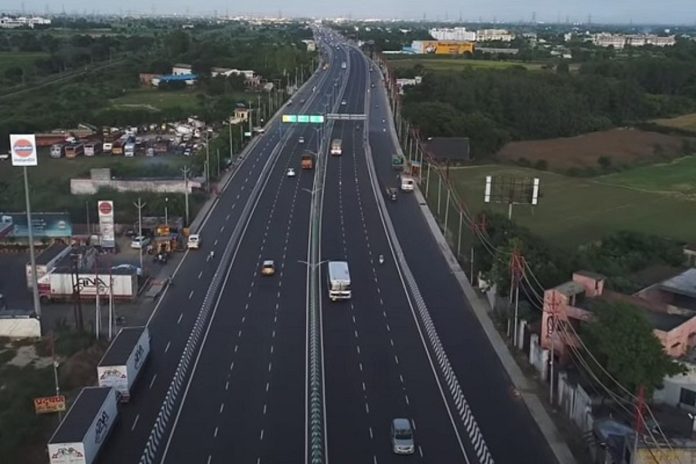The development of India’s first eight-lane elevated expressway, the Dwarka Expressway, is aimed at decongesting the National Highway (NH)-48 that connects Delhi and Haryana.
Furthermore, this extensive expressway infrastructure is expected to bring new opportunities for the real estate sector in its surrounding regions.
The Dwarka Expressway is a four-pack motorway which branches out from NH-8 near Shiv Murti, passing through Dwarka, and ends near NH-8 in Gurgaon near the Kherki Daula toll plaza.
Upon completion, the connectivity between Delhi and Haryana is set to improve substantially.
The travel distance between Manesar and Dwarka, as well as Indira Gandhi International (IGI) Airport, is set to witness a notable reduction subsequent to the expressway’s construction.
To offer a comprehensive overview of this significant infrastructural advancement, Union Road Transport and Highways Minister Nitin Gadkari took to microblogging site X, to share a video showcasing the much-anticipated elevated road project.
Marvel of Engineering: The Dwarka Expressway! A State-of-the-Art Journey into the Future #DwarkaExpressway #PragatiKaHighway #GatiShakti pic.twitter.com/Qhgd77WatW
— Nitin Gadkari (@nitin_gadkari) August 20, 2023
As outlined in the video, the estimated travel times for several key routes will undergo reduction, such as the travel time from Dwarka to Manesar will become 15 minutes, Dwarka to Singhu border in 25 minutes, and Manesar to Singhu border in 45 minutes.
Moreover, the project will enhance the connectivity of the upcoming International Convention Centre in Dwarka’s Sector 25.
The video comes only days after Gadkari voiced his disappointment over inadequate responses to to concerns posed by the Comptroller and Auditor General (CAG) which resulted in controversy over the cost of construction of Dwarka Expressway.
CAG Row Over Project Expenditure
The project has been steeped in controversy since the Comptroller and Auditor General of India (CAG) highlighted a significant rise in the construction costs of the Highway.
The CAG report indicated that the per-kilometre cost of the Expressway stands at Rs 250 crore, contrasting with the approved per-kilometre cost of Rs 18.2 crore by the Cabinet Committee on Economic Affairs (CCEA).
Since the CAG’s revelation of cost escalation, tensions have escalated between the government and the opposition, leading to a war of words on the matter.
In response, the government contested these assertions, arguing that that the methodology employed by the CAG to calculate costs oversimplifies the intricate nature of the project.
The Ministry of Road Transport and Highways (MoRTH) offered clarification, stating that the approval for the Bharatmala Pariyojana was given without specific project-wise cost approval.
The ministry had finalised the cost of Rs 91,000 crore for 5,000 km under the Bharatmala Phase-I project on August 10, 2016, for the fiscal year 2016-17 to the extent feasible.
“It only provided overall outlay for the programme. As such ascribing increase of cost from Rs 18.2 crore per km to Rs 250 crore per km is gross mis-representation of facts,” the Ministry said.
Minister Nitin Gadkari said Dwarka Expressway was not 29 kilometres-long as mentioned in the CAG report, but around 230 kilometres-long including the tunnels made as part of the project.
Gadkari said that according to this, Rs 9.5 crore was spent on every kilometre, according to reports.
The CAG report excluded elements such as flyovers, elevated roads, underpasses, tunnels, and ring roads, which substantially contribute to the overall construction expenses. These components were not initially included within the project.
Gadkari further added that he informed the CAG officials and they were convinced by the clarification. However, he said that they still went ahead with the report.
Ministry sources clarified that the CAG figures lack context. They explained that all four contracts for the Dwarka Expressway were tendered at an average civil cost of Rs 206.39 crore per kilometre.
However, the contracts were eventually awarded at a significantly lower rate of Rs 181.94 crore per kilometre, indicating a notable 12 per cent reduction from the original estimates.
Expected Completion of the Expressway Project
The Dwarka Expressway is a remarkable engineering achievement, featuring an eight-lane expressway on a single pier.
It was designed to accommodate current traffic, ensure seamless connectivity, and support future growth in the region.
This project contributes to reducing pollution in Delhi-NCR, similar to the benefits seen with the Eastern Peripheral Expressway and Delhi-Meerut Expressway.
The project also features India’s first four-level interchange and 3.8 km eight-lane tunnel.
The project utilised two lakh tonnes of steel (30 times the Eiffel Tower’s) and 20 lakh cubic meters of concrete (six times Burj Khalifa’s).
Nitin Gadkari, had in May 2023 inspected the expressway and expressed that the expressway will be operational shortly.
Additionally, the Minister mentioned that this project will help reduce the traffic load on the Gurugram-Jaipur National Highway.
The work on the construction of the cloverleaf section of the expressway has been completed.
Once ready, the four loops of the flyover will allow seamless movement towards key routes to get to the Delhi airport, Delhi-Gurugram Expressway, Dwarka Expressway, SPR and the under-construction Delhi-Mumbai Expressway.


